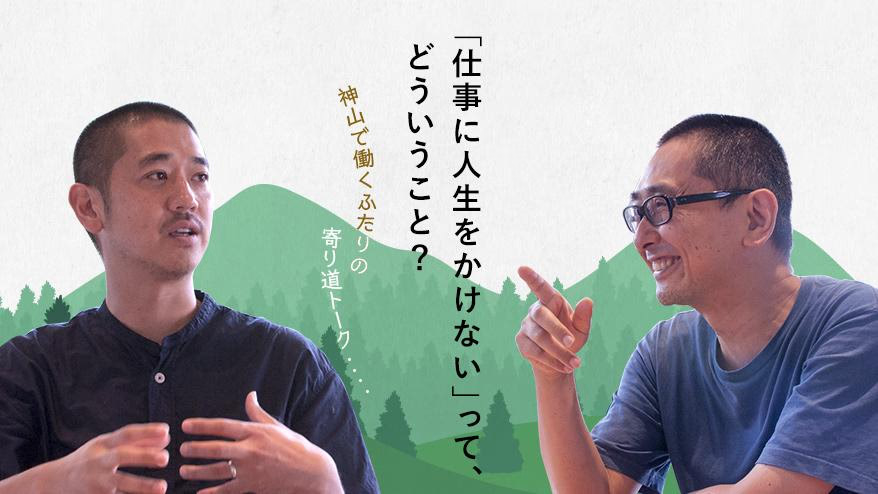ある日、西村佳哲さんより、同じ徳島県神山町で働いている真鍋(神山フードハブ・プロジェクト※1支配人 兼 モノサス部長)へ、「ちょっと聞いてみたいことがある」とお声がけいただき、はじまった会話の後編。
前編では「フードハブの掲げる “社会的農業” の “社会的” ってなに?」という話から、べてるの家の向谷地生良さんが言う「仕事に人生をかけない」の話におよびました。
後編では「“仕事に人生をかけない” としたら、わたしたちの仕事は何を支えにすればいいの?」という問いを中心に、神山で働くふたりが考えはじめたことをお伝えします。(対談構成:中庭佳子)
※1 神山フードハブ・プロジェクト:神山のワーキンググループが発端で立ち上がった、神山町役場、神山 つなぐ公社、㈱モノサスが共同で立ち上げた、神山の農業を次世代につなぐためのプロジェクト。
-
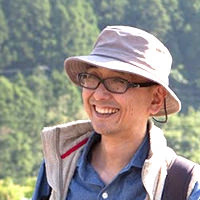
-
西村佳哲さんプロフィール:
建築分野を経て、"つくる・書く・教える"の三種類のお仕事を主軸に活動されている。"つくる" の軸はリビングワールドでのデザインのお仕事、"書く" の軸は『自分の仕事をつくる』をはじめ、働き方、暮らし方、生き方などについて書くお仕事、"教える"の軸ではインタビューのワークショップをメインに、聞き方、関わり方を教えるお仕事をされている。ここ2年ほど、町と立ち上げた「神山つなぐ公社」の仕事にドップリ。
-
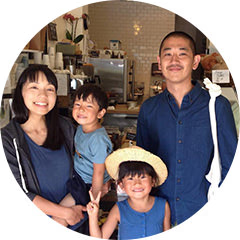
-
真鍋太一プロフィール:
モノサス プロデュース部 部長。広告の制作会社を経て、2012年7月モノサス入社。2014年に仕事で西村さんと再会し、その3月に偶然、西村夫妻と時期を同じく徳島県神山町に移住。東京と徳島の2拠点での活動を開始する。社会とつながり「暮らすように働く」という企業の価値をつくるべく、家族を実験台に検証中。2016年4月より、神山町と西村さんも所属する「神山つなぐ公社」が共同で立ち上げた、「㈱フードハブ・プロジェクト」の支配人(COO)も務める。
仕事をするぼくらの、この頑張りみたいなものを
支えるエネルギーってなんだろう?
西村さん(以下敬称略)
僕も真鍋さんも相当働いているけども、この頑張りを支えるエネルギーが要るとして、それを仕事そのものや、そこから得られる反応から得ようとすると、なんか勘違いするんだろうなと思っていて。
じゃあどこでエネルギー補給してる?真鍋さんは?という話がしたかったの。
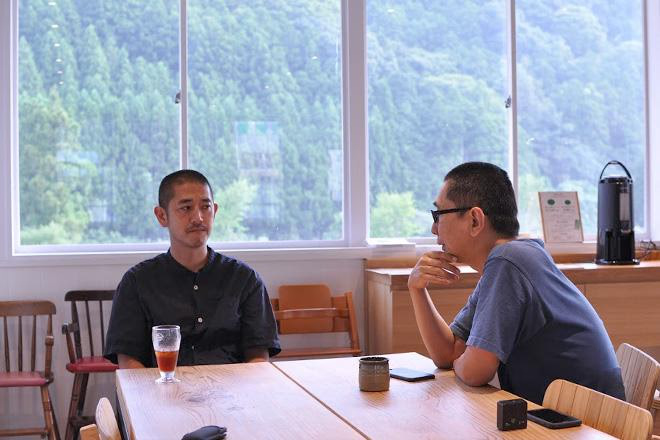
真鍋(左)、西村佳哲さん(右)
真鍋
できてないかもしれないですね、そういう意味で言うと。
いち部分ではできていると思うんですよ、きれいごとになっちゃうかもしれないんですけど、モノサスの役員からは「基本、うまく行っている物事を、よりうまくいかせることが真鍋太一の仕事だ」と。トラブルがあると、逃げはしないけど得意じゃないんです。
社会的企業とかソーシャルベンチャーって、ネガティブなことをポジティブにするところで活動するところとが多いじゃないですか。それが私、あんまり得意じゃないです。
ポジティブなことをよりポジティブにするところにエネルギーとかモチベーションもわくし、上手にやれるというところがあって、そう言う意味で「食」っていう文脈を選んでいるのは、ずるいですよね。
西村
ずるいっていう感覚があるんだ。
真鍋
ありますよね。やっぱり食って毎日のことだし、おいしければほとんどの人がハッピーになれる。そして、それが体に良いものであればみんなにとって良いという。ある種、文脈設定がされているところで、もうひとつの選択肢をつくるというか、大義名分をつくるというか。極力ネガティブな要素を排除した文脈の中でやっているので、エネルギーを取られる感覚がないんです。
西村
なるほど。
真鍋
あらめて思うと、自分の得意なところへ落とし込むために、感覚的にネガティブなものを避けて来たのかもしれません。ただ、やっぱり社会ってそれだけだと成り立たないから、社会のネガティブな部分を解決してくれている人がいることに理解はしているんですけど、自分はそこにモチベーションを感じないというか、得意じゃない、と思うんです。ソーシャルベンチャーなどから距離をとっているのは、そういうことかもしれません。
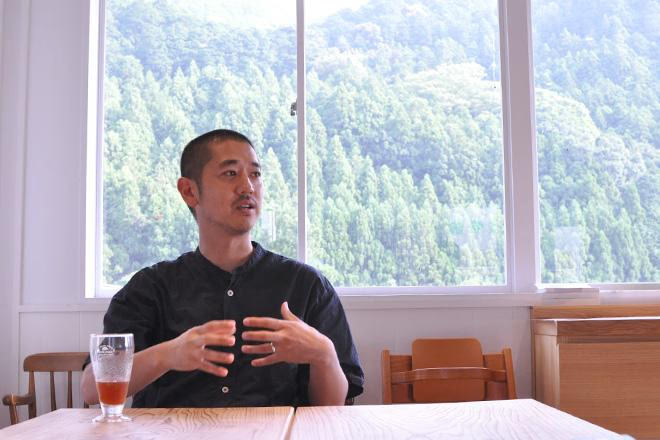
西村
ネガティブなことをポジティブにするんじゃなくて、ポジティブなことをよりポジティブにするというのが自分の取り柄という。
真鍋
なのかなぁと。そういう意味で言うと、エネルギーが取られていく感じがあんまりなくて。
西村
循環している感じだよね。
真鍋
やることで返ってくる感じはあります。とはいえ、減っていってる感じもあるはあるんです。
やっぱり一番減るのは、内部がうまくいかないとき。やろうとしている目的はおなじなのに、内部的にそれをやるのはすごく大変で。疲弊していくことにエネルギーを使うことは全然いいんですけど、取られていきます。取られるエネルギー量は、お客さんから「おいしいです」と言われることだけでは補充できないほど…。
ただ、取られていく部分はうまくいきはじめるとバァーンって返ってくるから、それを分かってやってるから耐えられる。それはチームでやる楽しさと裏腹な部分です。
西村
中のことって、お互いに依存しあうからね。働くスタッフ側もマネージメント側も、お互いに甘える部分があるから、疲れるよね。
真鍋
西村さんがうまいことを言っていて、「社会的な部分ではあんまり疲れないんだけど、会社になったらものすごくエネルギーを取られる」と。今のフェーズは取られているというのがあります。
西村
循環がおこると、ひとつの生き物みたいになって機能するわけだけども。それは別の話かな。
真鍋さんはてっきり、仕事そのものからエネルギーを得ないとか、そういうわきまえを持とうとしているのかなと思っていて、それでちょっと聞いてみたんだけど、そうでもなさそう。仕事そのもので喜びとか、喜ばれるとか、そういうところからエネルギーをもらっている感じだね
真鍋
そうですね。ずっとそうじゃない時期が続いていたんです。広告制作会社で働いていたときはずっと、仕事から喜びを得ないようにする、もしくは、そこから喜びを得られるように変わらないと続けられないなと、思いながらやっていたので。
モノサスが面倒くさいことに「ともに生きていきたい人たちとはたらく」と言っていて。ある段階から「この人とは生きていきたい」と思える人としか一緒に仕事をしないと決めてやっていて、今はよくも悪くも家族と思えるような仲間たちで固めています。モノサスのメンバーも、アメリカのメンバーも料理人も、神山のメンバーも含めて。
そいういう意味では、エネルギーを取られない相手で固めてきていて、それで今が成り立っているのがすごいありがたいことではあります。そうじゃなくなったときには、変わってきますよね。
プライベートからでもなく、仕事からでもなく
ではどこから?
真鍋
今日の「仕事に人生をかけない」という話を聞いていて思ったのは、仕事ってパブリックなもので人生って個人なものなんだなと。だから仕事に個人の人生かけられても仕事が困るよね、と私は受け取りました。
西村
(笑)
真鍋
今は自分の状態はいいし、フードハブの活動の状態もいいときはいい。それが私の人生がちょっとよくない方向にいったときに、仕事に私の人生をのっけようとすると、仕事がかなり迷惑だろうなと。
西村
仕事が迷惑?会社が迷惑というより?
真鍋
仕事そのもの、活動そのものが迷惑だろうなと。やっぱり仕事って自分から切り離されたところに、ちょっとあるべきじゃないですか。仕事は仕事でしょ?というのが、良くも悪くもあって。その感覚って実は大事で、そこで個人の気持ちとかにあまりにも執着させすぎると、ある種仕事が仕事じゃなくなるんです。
西村
自分の投影のようになって、パブリックなものにならない。
真鍋
そうです。そういう意味で、「仕事に人生をかけない」というのはよく理解できる。そりゃ仕事が迷惑だよ、という感覚はあります。
西村
向谷地さんの話にも、そのニュアンスは入っていると思う。
向谷地さんの話はね、なんていうかな、例えば彼は病院で働いていたことがあって、緊急の患者さんがけっこう担ぎ込まれてくると。そうすると、お医者さんから看護師さん、なんとかの専門家から、みんな必死になって緊急外来患者に対応するし、向谷地さんもソーシャルワーカーとして関わる。
で、一命は取り留めた。ひと仕事終わった自分たちは部屋に戻ってタバコを一服吸って、「今日自分たち、やったね」みたいな満足感や達成感が生まれてしまうのだけど、廊下では家族が大変なことになっちゃったとさめざめ泣いている。そんな状況をみて、自分はこの種の満足感や達成感はいただかない「わきまえ」を持とうと、その頃決めたと言っていた。
向谷地さんのその「仕事と自分を撞着させない」という区分が見事だなと思う。例えば統合失調症の人が「放火しちゃったんです」と相談してきたとき、「ああ、放火現象が起こったんですね」という風にちょっと言い換えるの。本人がその只中にいて、出来事と人格が何もかも一緒くたな状態で話しているときに「現象が起こった 」と言い換えることで、一緒に外側に立って客観性を生もうとするんだよね。
これはべてるの家が重ねてきた“当事者研究※2 ”の基本構造だと思うけど、それって中動態※3 の話と同じで、「私」とその「行為」が一体化しているところ、「主体」と「意志」みたいなところを分離させて自由にさせるところが、向谷地さんにはある。その彼のまわりで、いろんな人が自由になっていくというのが面白いなと思っていて。
えっと。何が言いたかったか。向谷地さんも「仕事と自分を一体化させない」と言っていて、慎重だなと思ったんです。
※2 当事者研究:べてるの家ではじまった、精神疾患を持った当事者やその家族を対象としたリハビリプログラム、もしくは自助ツール。自分の苦労を語ったり研究対象とすることで問題を「外在化」させ、客観的に捉えることができたり、仲間や援助者へ共通理解を促すことができる。
※3 中動態:現在、わたしたちが慣れしたしんでいる行為の分類は「能動態(する)/受動態(される)」だが、かつて古典ギリシア語などのインド=ヨーロッパ語は「能動態(内側)/中動態(外側)」で分類されていた。「能動態/受動態」では行為の主体を確定したり、行為者の「意志」を問うものだが、「中動態」では主体の「意志」は前景化されず、ある種出来事を描写するような形で使われる。
(参照:國分功一郎 著『中動態の世界-意志と責任の考古学』医学書院 2017年)
真鍋
だから続けられるんでしょうね。大変な仕事だし、エネルギーも相当と取られるだろうけど。切り離して。うまくマネージしているんでしょう。
西村
真鍋さんもめっちゃ働いている。側から見ても。フードハブのみんなもそう。ひとりずつ聞いてまわりたいくらい。中でも真鍋さんは矢面に立たされたり、スタッフの間に立ったり、そういうところでエネルギーがいるわけで、そのエネルギーをどうしているのかな?と。
真鍋
マネージできてないんだと思います、やっぱり。補填が必要だなと考えているところなので。休みの休み方っていうのもありますよね。
西村
プライベートでエネルギーを持て、という話?
真鍋
うーん…。それとは違うと思うんです。
西村
いわゆるソーシャルベンチャーとか社会的企業というのと、僕らがやっていることはちょっと違うけれども、社会的な仕事をしていることは間違いなくて、この種の仕事におけるエネルギーの自給をどうやってるかな?という話を交わしてみたかったんだよね。でも、自給はできてないってところか。
真鍋
できてないっていうことですかね。
西村
あのね、例えば仕事で満たされない人が、プライベートのリア充話を嬉々として話していたりすると「それでいいの?」と思うんだよね。仕事と自分自身を重ね合わせにくいとか、仕事自体に構造的な問題があるのは理解も想像もできるんだけど、じゃあプライベートの方を充実させてそこからエネルギーもらってればいいって話じゃないだろうと。かと言って、仕事のそのものから得られる反応からのみもらっていると、間違いやすいなと。
じゃあどこでもらうんだ?という話がしたかったかな。
真鍋
今ようやく思考の運動が終わったくらいの感じなので、もう一度ちゃんと話させてもらえますか?
西村
じゃあまたいつか(笑)。今日は以上で。
